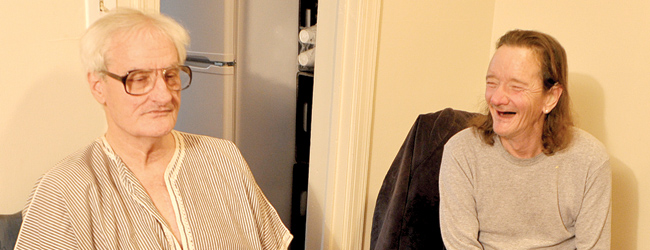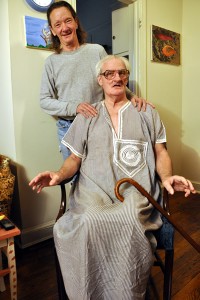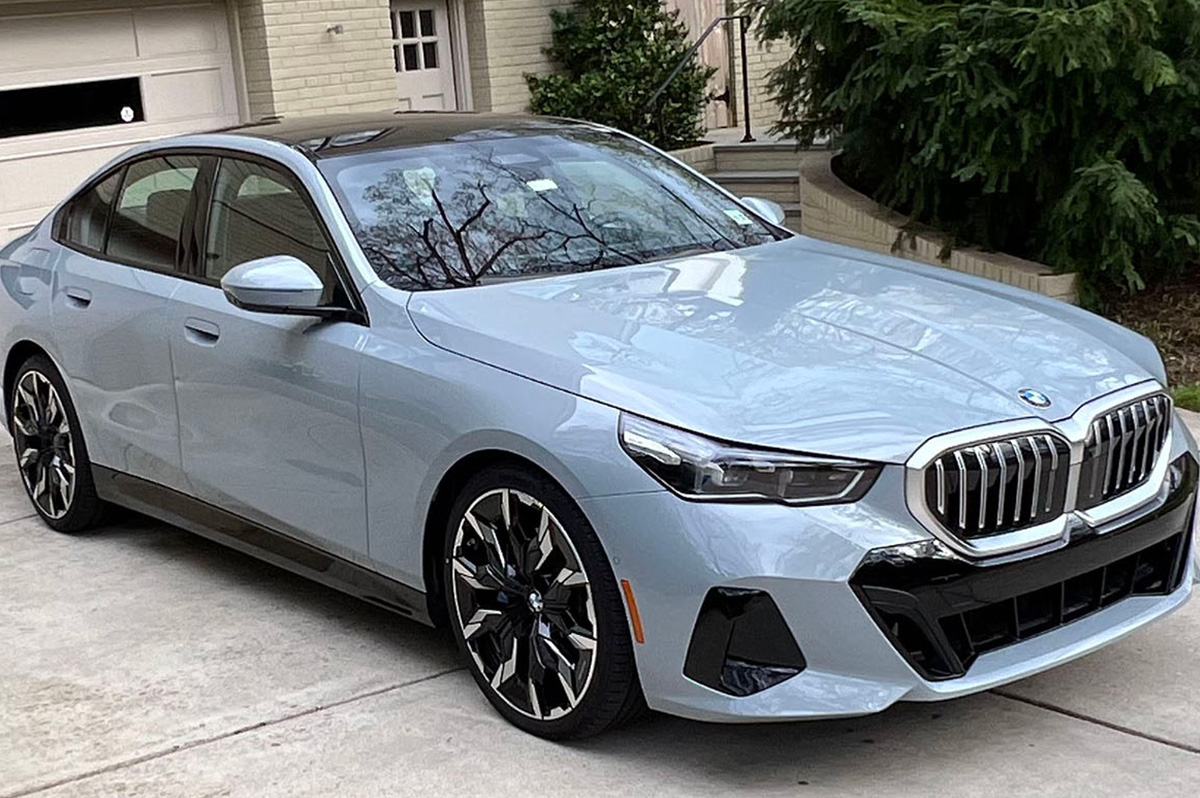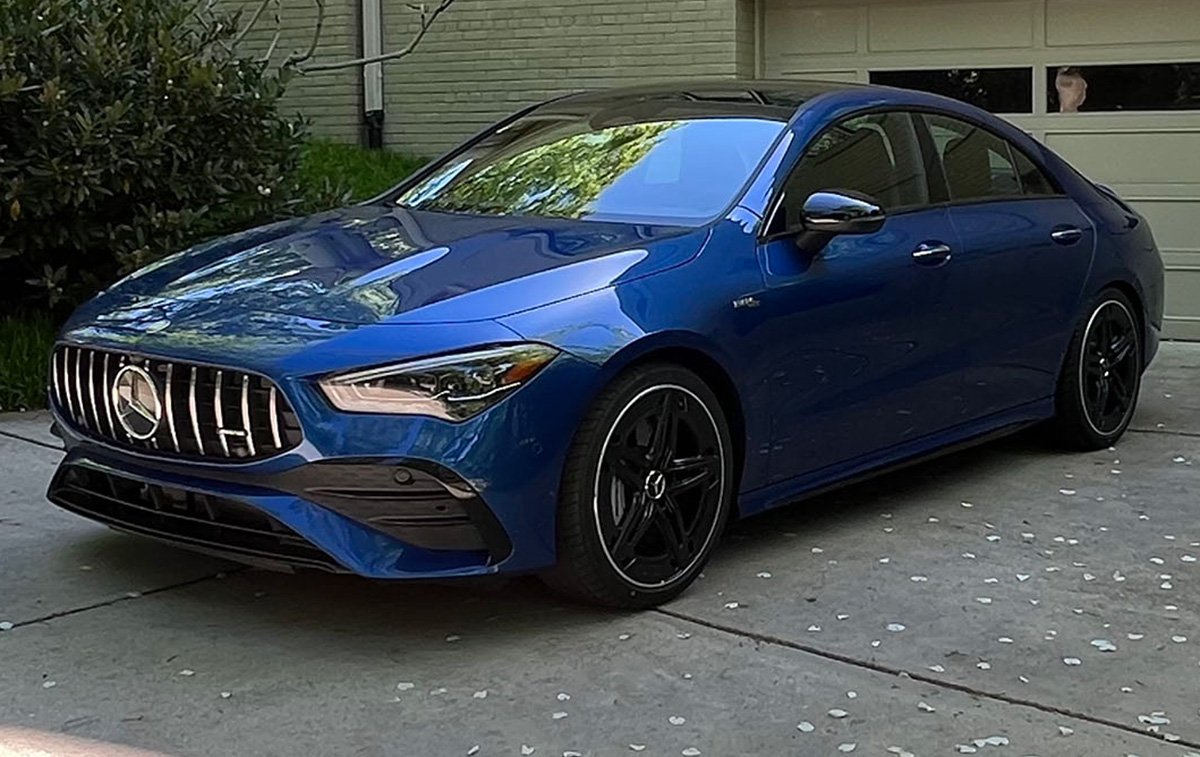Living
‘This is my family’
Partners of 39 years turn new page after surviving homelessness, alcoholism


Terry Ward, 66, seated, and Bob Cyrus, 60, are celebrating this Valentine’s Day in a new home after an adventurous 39 years together. (Washington Blade photo by Michael Key)
Terry Ward, 66, and Bob Cyrus, 60, have been a couple for 39 years and like a comedy team from old-style vaudeville, each is a straight man to the other, setting each other up for one-liners, often in politically incorrect terms.
They nudge each other with constant ribbing, affectionately but sometimes there’s also a dab of vinegar with the sugar, as when Ward calls Cyrus “a whore,” even as they each tumble into well-practiced personality pratfalls.
Each can finish the other’s sentences and their patter can be hard to follow, unless you hear the inner nuance, which always seems to turn on being each other’s eternal best friend.
Until two weeks ago, they were homeless and living in a shelter. And for years they were hopelessly alcoholic, yet still they clung to each other for love and support.
One is largely deaf, the other is blind in one eye. They are real characters, scarred by life’s twists and turns yet they’re still able to find the fun in their life together even if they have to create it themselves. Ward, blind in his right eye since a stroke last year, says, “We’re never bored — he can’t hear and I’m blind and I’ll hide his hearing aid and he’ll hide my teeth.”
And on April 1 — yes, on April Fools, for they seem to delight in having fun with every part of life — they plan to be married. But that’s only if, says Ward, Cyrus will spring for an engagement ring.
They live in a rent-subsidized apartment in Washington obtained for them by a non-profit social service agency, the U.S. Veterans Initiative (USVI), when it was discovered one of them had been a veteran — Ward served two years in the U.S. Navy mostly on a destroyer in the Mediterranean — and they had been homeless, but had shaken off alcohol and now were ready to start their lives anew.
Speaking of Emily Button, who acts as their case worker in her capacity as the Initiative’s housing director, Ward says, “She’s more than a sweetheart, she’s a jewel.”
Button stepped in and pushed through all the paperwork to make sure in late January that Ward and Cyrus could move out of Clean and Sober, a shelter and alcohol rehabilitation center located at 2nd and E Streets, N.W., where Ward had been living for 22 months and Cyrus for 17 months, and into their own, neat-as-a-pin one-bedroom apartment where their lives are now all about starting over.
Ward can reminisce with a touch of sarcasm about how they met, in 1972, when Cyrus was only 21, and fresh out of Huntington, W.Va. He’d left there after finishing high school and came to Washington to take a clerk’s job in a city post office. Cyrus was already an alcoholic — he says he began to drink, mostly screwdrivers, as young as 13, at about the time he also realized he was gay. By 15 he knew he was hooked on booze because, he says, “It made me feel good.” By 21, he says the pattern was fixed in place — binge drinking followed by frequent blackouts and memory loss.
Ward remembers the rainy Friday night he met Cyrus. Ward was coming home from his job at the Market Inn restaurant. He stopped the cab he was in when he saw Cyrus incoherent and sprawled on his bicycle tilted into a gutter near 9th and Pennsylvania Avenue where water from a rainstorm was coursing all around him. Out of concern, Ward went to offer help, but Cyrus responded only to say, “Fuck you.”
“I was mean and nasty then,” Cyrus says. He admits he sometimes still is. Ward agrees: “He’s selfish because he was the only boy in the family.”
A year later they met again when both were working at the Channel Inn restaurant. They’d remembered their earlier meeting. Cyrus says they didn’t get along. Ward was out but says, “Cyrus wouldn’t admit for years that he was a homosexual,” even though he was having sex in West Virginia when he was 13.
Born in Portsmouth, Va., in 1944, Ward never saw his mother, because she “walked out of the hospital,” he says, the day he and his twin sister were born, and she never came back. Raised by an aunt he called mom he remembers being 8 and wearing his sister’s Brownie uniform to sell cookies door to door. He’d come home and be Jane in their childhood recreations of the “Tarzan” adventures they saw at the movies.
Sexually, the two always led different lives. They were sexually adventurous and are candid with tales from their glory days.
Somehow, though, the two stuck together through many ups and maybe many more downs. Despite their hedonism and alcohol abuse, they escaped HIV.
“Almost all our friends from then are dead now,” Cyrus says.
So what made it last?
“We’re the best of friends,” Ward says. “This is family and I love him. Can’t you love someone without sex? It’s probably why we’re still together because we don’t have sex. He does his thing and I do mine.”
The couple says they were never each other’s types sexually so they never consummated their relationship. It’s common, experts say, for long-term couples to no longer have sex after many years together but is it unusual for couples to have never had sex?
“I would kind of think so myself, but they may be affectionate in other ways,” says Michael Radkowsky, a local gay psychologist who counsels gay couples. He mentions singer Margaret Whiting who married gay porn star Jack Wrangler and had a non-sexual union.
“They just said they were great companions in every other way and wanted to spend their lives together,” Radkowsky says. “So it does happen and there’s no reason to pathologize it. If they’re happy, they’re happy and it works for them.”
As for their alcoholism, Ward had more control over the addiction, always able to keep a job, while Cyrus frequently would lose his. They hit bottom, respectively, especially when they fell on hard times after Ward sold his home and then gave the money to a son he’d fathered during a two-year marriage in the mid-‘60s. It became increasingly obvious that alcohol was a problem — they sometimes spent as much as $300 a week on liquor and bought it by the case.
Now Ward says, “I’m 66 and I’ve got a new life ahead of me,” saying that they have each dropped all their old drinking friends who typically would mostly spend their time together drinking.
“When you sober up, you learn to love yourself,” Ward says.
They continue to help each other. Cyrus, who was hearing impaired at birth and heard at “about 30 percent” now, relies on his partner’s ears. In addition to his vision problems, Ward uses a cane since a fall several years ago.
“Life itself, you just have to work at it,” Ward says. He looks over fondly at Cyrus and says, “At least with this one, I know what I’ve got, he’s my caretaker now – I’ve always been his caretaker, and now it’s my turn.”
“I love him from the bottom of my heart,” Ward says. “This is my family.”
Autos
Sporty sedans: BMW 530i xDrive, Mercedes AMG CLA 3
Tariffs are here and the result is financial chaos

It’s official: Tariffs are here, and the result is financial chaos.
So, what to do when purchasing a new vehicle? If you need one in the not-so-distant future, buy sooner (like yesterday) rather than later. Expect prices to rise quickly, as inventory dwindles, demand soars, and automaker incentives evaporate. Of course, if a new ride isn’t a priority for at least a year or three, then hold off until the dust settles.
But for those of you looking for new wheels now, I recently drove two sport sedans that were a pleasant reprieve from the usual plethora of pickups, minivans, and SUVs.
BMW 530i xDRIVE
$63,000
MPG: 28 city/35 highway
0 to 60 mph: 5.5 seconds
Cargo space: 18.4 cu. ft.
PROS: Rakish looks. Race-car vibe. Rock-star amenities.
CONS: Rad-but-quirky infotainment system. Rich price.
IN A NUTSHELL: Classic good looks, from the iconic grille and swept-back headlights to chiseled side panels and a tasteful tush. For a gearhead like me, the BMW 530i xDrive — completely redesigned last year — is as rapturous as Michelangelo’s David. Everything here is in proportion, from the design to the drivetrain, which — along with a gutsy 255-hp turbo and all-wheel drive — helps deliver a divine experience behind the wheel. Even better, my test car came equipped with the heavenly M-Sport Package: 21-inch wheels, athletic suspension, and assorted styling upgrades.
A tech-laden cabin is outfitted with a sparkly 12.3-inch digital instrument cluster and 14.9-inch touchscreen infotainment system. With the windshield head-up display and a slew of knobs and toggle switches in the center console and on the steering wheel, I wondered if this is how it feels to pilot the Space Shuttle. There is even a back-lit interaction bar with touch-sensitive controls to adjust vent direction and other climate control settings.
All this gadgetry takes some getting used to, but the overall effect is dazzling. While a 12-speaker Harman Kardon stereo comes standard, I was jammin’ to the 16-speaker Bowers & Wilkins premium audio. Of course, such options add up quickly (on my test car, the extras totaled $13,000).
Just how fun is this car? In my favorite episode of “Hacks,” sassy Jean Smart drives a rockin’ Rolls Royce Wraith. Trust me, this four-door BMW is every bit the badass as that $300,000 super coupe.
MERCEDES AMG CLA 35

$58,000
MPG: 22 city/29 highway
0 to 60 mph: 4.8 seconds
Cargo space: 11.6 cu. ft.
PROS: Slick styling. Spiffy cabin. Sublime seats.
CONS: Smallish trunk. So-so rear headroom and legroom.
IN A NUTSHELL: Need a smaller sedan that’s just as marvy as the midsize BMW i530? Look no further than the compact Mercedes CLA-Class, which is 14 inches shorter. That’s a benefit when jockeying for parking or navigating rush hour.
Another plus: This is Mercedes’s least expensive sedan, available in three trim levels. All come with the same potent turbo but in varying power levels. The base model starts at $46,000, but I tested the first of two high-performance versions: the AMG CLA 35, which costs $12,000 more. You can open your wallet even further to snag the $67,000 AMG CLA 45.
But why bother? The AMG CLA 35 is plenty quick — faster than the BMW i530 — and boasts sport-tuned brakes, deft handling and a gritty-sounding exhaust system. The laundry list of standard features includes all-wheel drive, automated parking, gobs of the latest safety gizmos and even something called “safe-exit assist,” which prevents passengers from opening a door into traffic or speeding cyclists.
The interior is pure Mercedes, with top-notch materials, customizable ambient lighting and Burmester surround-sound audio. The overall layout—sleek and modern, but with elegant stitching in the seats and on the door panels and dashboard—is comfortable and user-friendly. Digital displays and touchscreens are similar to what’s in the BMW i530, just smaller.
Size matters, of course, which is why this vehicle’s shorter length can be a blessing but also a curse, especially when trying to squeeze passengers with longer legs into the backseats. And the dramatically sloped roofline, attractive from the outside, limits the amount of rear headroom and cargo space. Thank the automotive gods for panoramic sunroofs, which—at least for anyone in the front seats—makes this cabin feel surprisingly spacious.
Real Estate
Spring updates to sell your home for pride and profit
Consider new landscaping, power washing, creative staging

Selling a home is a big deal for anyone, but for members of the LGBTQ+ community, it comes with unique considerations—from finding affirming professionals to ensuring your home is represented in a way that reflects your values. Whether you’re a first-time gay home seller or a seasoned LGBTQ+ homeowner looking to move up, maximizing your home’s value is key to a successful and empowering sale.
Here’s how to prepare your home, your mindset, and your real estate strategy to get the most value—financially and emotionally—from your home sale.
1. Start with an LGBTQ+-Friendly Real Estate Agent
Before diving into renovations or staging, make sure your agent truly understands your needs. A gay-friendly or LGBTQ+-affirming real estate agent brings more than just market expertise—they bring cultural competence, safety awareness, and a network that supports you throughout the selling process.
At GayRealEstate.com, you can find experienced, vetted LGBTQ+ real estate agents who have been proudly serving the community for over 30 years. Working with someone who shares or supports your identity ensures your selling journey is respectful, inclusive, and effective.
2. Enhance Curb Appeal—With a Welcoming Vibe
The outside of your home is the first impression a potential buyer gets. Make it count—especially for LGBTQ+ buyers looking for a home that feels safe and welcoming.
- Fresh landscaping: Add colorful flowers, neatly trimmed shrubs, or low-maintenance greenery to appeal to eco-conscious buyers.
- Update the entrance: A new front door, stylish lighting, or even a rainbow doormat can make your home feel like a safe space from the start.
- Clean and repair: Power wash the exterior, touch up paint, and make any necessary repairs to gutters, windows, or siding.
3. Stage with Intention and Inclusivity
Home staging can add thousands to your sale price. But beyond the usual decluttering and neutral palettes, think about how your space tells a story—and who it’s telling it to.
- Create a warm, inclusive feel: Subtle touches like LGBTQ+ art, books, or even coffee table magazines can show off your personality and affirm the space for queer buyers.
- Depersonalize—but don’t erase: You don’t need to hide your identity to appeal to buyers. Let your home feel lived in and loved—while still being a blank canvas others can imagine themselves in.
- Highlight multi-use areas: Home offices, gender-neutral nurseries, or flex spaces resonate with LGBTQ+ families and professionals.
4. Update Kitchens and Bathrooms Strategically
These rooms matter most to buyers—and even small updates can yield big returns.
- Kitchen: New cabinet hardware, a fresh backsplash, and modern lighting can elevate the entire room without a full remodel.
- Bathroom: Replace old fixtures, re-caulk tubs and sinks, and add plush towels and inclusive décor.
- Energy-efficient upgrades: Touchless faucets, smart appliances, or low-flow toilets are not only trendy—they signal sustainability, which matters to LGBTQ+ buyers.
5. Make Your Home More Energy Efficient
LGBTQ+ homebuyers often prioritize sustainability. These updates not only reduce energy bills but make your home more marketable.
- Install a smart thermostat (like Nest or Ecobee)
- Upgrade insulation or windows
- Consider solar panels (especially in sun-drenched regions like California or Florida)
Bonus: You may qualify for state or federal tax credits, which can be a great selling point.
6. Know and Advocate for LGBTQ+ Housing Rights
Although housing discrimination is illegal under the Fair Housing Act, it still happens. As an LGBTQ+ seller, be aware of your rights—and those of potential buyers.
- Avoid steering or bias: Even with good intentions, make sure you’re not inadvertently influencing who views or buys your home based on identity.
- Work with affirming professionals: From inspectors to lenders, choose partners who support inclusive practices.
- Report discrimination: If you or a buyer encounters bias, report it to HUD or your local housing authority.
7. Price Your Home Right—and Market It Smartly
Setting the right price is essential to maximizing value. Your LGBTQ+-friendly agent can run a comparative market analysis, considering current trends and buyer demographics.
- Leverage LGBTQ+ real estate networks: Promote your home through platforms like GayRealEstate.com to reach an audience that understands and values your space.
- Use inclusive language in listings: Avoid gendered terms or heteronormative assumptions. Instead of “his and hers closets,” use “dual walk-ins” or “double closets.”
- High-quality photos and video tours: Showcase your home with professional, visually inclusive marketing that appeals to diverse buyers.
8. Consider Timing and Local LGBTQ+ Trends
Selling during WorldPride or just before local LGBTQ+ events may boost visibility. Also consider if you’re in or near an LGBTQ+ friendly city or neighborhood.
Not sure which areas are top destinations? GayRelocation.com tracks and shares the best cities for LGBTQ+ homebuyers, helping you tap into motivated buyers.
Final Thought: Sell with Confidence—and Community
Selling your home isn’t just about getting top dollar—it’s about closing a chapter with pride and integrity. When you center your values, work with LGBTQ+ affirming experts, and prepare your home with purpose, you’re not just maximizing your home’s value—you’re creating an empowering experience for yourself and the next owner.
Whether you’re buying, selling, or both—GayRealEstate.com is your trusted partner in every step of your journey. With a nationwide network of gay and lesbian realtors, decades of experience, and deep community ties, we ensure your home transition is safe, smart, and full of pride.
GayRealEstate.com is the nation’s leading online platform connecting LGBTQ+ home buyers and sellers with LGBTQ+ friendly real estate agents, ensuring a safe and supportive experience.
Scott Helms is president of GayRealEstate.com. To find an agent or learn more, visit GayRealEstate.com, GayRelocation.com or call 1-888-420-MOVE.
Real Estate
Navigating DMV real estate market during political unrest
Reductions in federal employment have introduced uncertainties

The Washington, D.C.-Maryland-Virginia (DMV) region has long been recognized for its robust housing market, underpinned by the presence of the federal government and a diverse economic landscape. Recent massive reductions in federal employment have introduced uncertainties, yet the area continues to offer compelling reasons for prospective homebuyers, particularly within diverse communities.
While the federal government has traditionally been a significant employer in the DMV, the region has proactively diversified its economic base. Sectors such as technology, professional services, education, and healthcare have expanded, mitigating the impact of federal job cuts. This diversification fosters some economic resilience, which offers our area a semblance of protection against the impending unknowns that we currently face. Nothing can shield real estate entirely; however, our area tends to survive these types of changes better than other parts of the country.
Despite concerns over federal layoffs, the DMV housing market has demonstrated notable stability. Analyses indicate that the number of active listings, sold properties, and median sales prices have remained steady on a year-over-year basis. This steadiness suggests that the market is adapting to changes without significant disruption.
Furthermore, while there has been a slight increase in home listings, this trend aligns with typical seasonal variations and does not solely reflect federal employment changes. The luxury property segment, in particular, continues to thrive, indicating sustained interest and investment in the region.
The DMV region is renowned for its cultural and demographic diversity, with areas like Montgomery County, Md., being among the most ethnically diverse in the nation. This inclusivity extends to various communities, including LGBTQ individuals, fostering a welcoming environment that enhances the area’s appeal. Even though the current administration is fostering anti-diversity ideology, I remain confident that our LGBTQ community will continue to thrive even as these destructive forces work against us.
Local governments within the DMV have implemented policies aimed at promoting affordable housing and preventing displacement, particularly in the wake of economic shifts. Initiatives like the Douglass Community Land Trust in Washington, D.C., exemplify efforts to maintain housing affordability and support community stability.
Additionally, jurisdictions such as Montgomery County have longstanding Moderately Priced Dwelling Unit (MPDU) programs that require developers to include affordable housing in new residential developments. These policies contribute to socioeconomically mixed neighborhoods, benefiting diverse populations.
Despite Elon Musk’s brandishing of a chainsaw to the federal workforce, our real estate market continues to thrive. The DMV region maintains its appeal. Economic diversification, market stability, commitment to diversity and inclusion, and progressive housing policies collectively contribute to an environment that supports and attracts diverse communities. Prospective homebuyers can find reassurance in the region’s resilience and ongoing efforts to foster an inclusive and vibrant community. These are only a few among the many reasons to have a positive outlook while considering real estate options in our area.
It is important to consider working with brokerages, brokers, agents, lenders and title companies who align with our community and our objectives. Not all LGBTQ agents work for brokerages that support or understand the needs of the members of our community. Do your research and find out who has donated money to what political causes. Now more than ever we must support members of our community to protect our way of life and our very existence.
Stacey Williams-Zeiger is president/principal broker of Zeiger Realty Inc. Reach her at [email protected].
-

 State Department5 days ago
State Department5 days agoHIV/AIDS activists protest at State Department, demand full PEPFAR funding restoration
-

 Brazil5 days ago
Brazil5 days agoUS lists transgender Brazilian congresswoman’s gender as ‘male’ on visa
-

 District of Columbia5 days ago
District of Columbia5 days agoCapital Pride wins $900,000 D.C. grant to support WorldPride
-

 Obituary4 days ago
Obituary4 days agoLocal attorney, LGBTQ rights advocate Dale Sanders dies at 75






